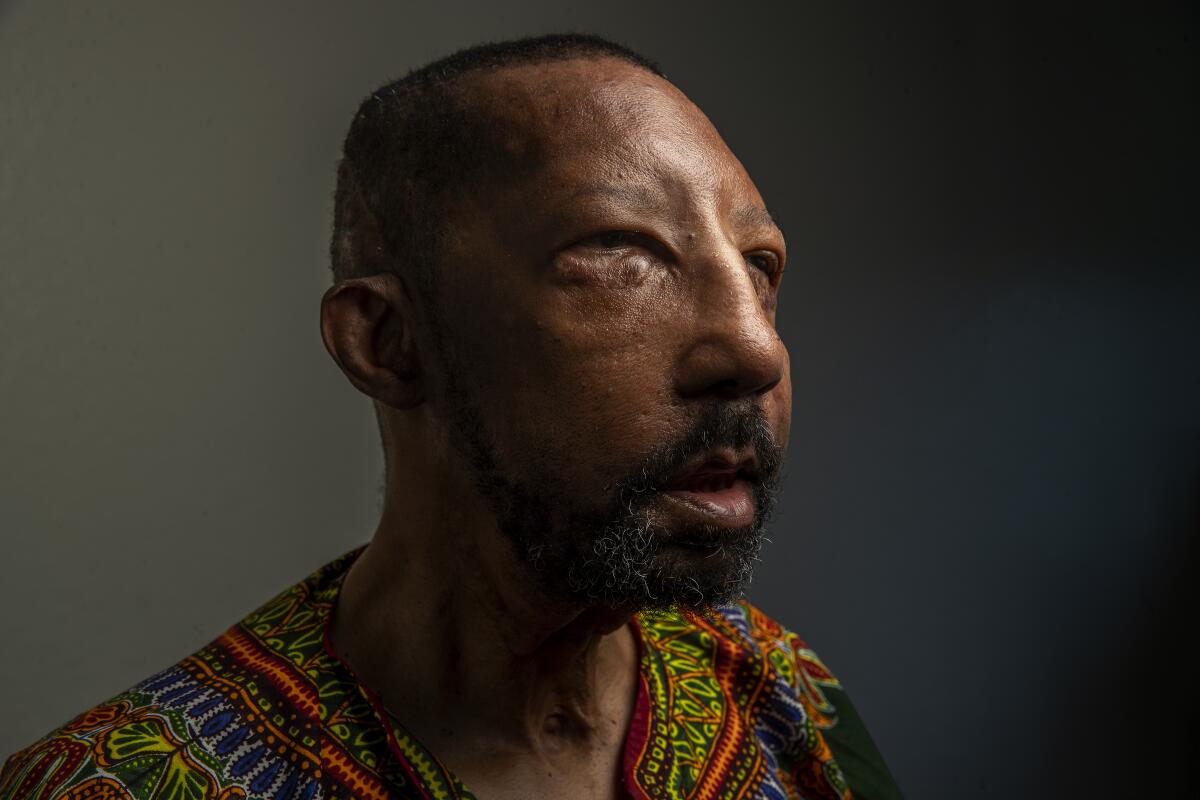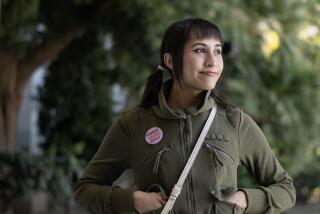First African American full-face transplant recipient: ‘I share what I look like’

- Share via
Robert Chelsea waited with his sister to be seated at a restaurant in Los Angeles. It was his first time going out to eat since he awoke from a six-month coma — and it would be years before he would receive a rare face transplant.
“He looks like a zombie,” a little boy in the restaurant screamed as he ran behind his embarrassed father.
Chelsea laughed it off; he had become used to people being afraid of him or turning their heads away because of his appearance.
Ten years ago this August, he was driving home from church when his car overheated on a freeway in Los Angeles. He pulled over to the side and called roadside assistance. As he waited in his car, a drunk driver rammed into him. Chelsea’s car exploded in flames, changing his life forever.
“My skin is exposed and can burn in the sunlight because I don’t have that outer dermis,” he said. “When it’s warm, my body gets super hot. Same with the cold. I had no lips and could not go into any body of water because I would drown.”
Doctors advised Chelsea, who now had to drink liquids with a syringe, that plastic surgery could protect his mouth.
Four years ago in July, at age 68, he became the first African American and the oldest person to receive a full face transplant. He has dedicated the last decade to advocating for people with disabilities through his nonprofit, the Robert Chelsea Foundation.
“I was in an accident, but someone was born that way,” he said. “I advocate for our disabled diaspora to raise awareness and the support that needs to come with it.”
Chelsea has spoken at conferences and medical schools about the importance of diversity in the medical field and of the disparities in treatment people of color may experience as patients. He also speaks at middle and high schools to encourage children to be more accepting of others with disabilities.
“I share what I look like with my burned legs, face and arms,” he said. “Some of their peers may look like that too underneath their clothing, and they shouldn’t tease others because they don’t know what they went through.”
Chelsea has maintained a positive outlook since the crash, but the changes were sometimes difficult for his family to process.
Ebony, his daughter, recalls receiving news of her father’s accident 10 years ago. She was at the home of her mother — Chelsea’s ex-wife — when she was bombarded by multiple incoming calls from an unknown number.
When she answered, police said they had been trying to get in touch about her father. She was a college student in her early 20s at the time. She racked her brain for a reason for the calls and thought, “I don’t have any money.”
Ebony Chelsea feared police were contacting her to bail out her father. But what they told her was much worse.
Her father had fallen into a coma after a fiery crash on the freeway. “I started screaming,” she said.
She, her mother and his sister immediately went to Norwalk Hospital, where Chelsea was in intensive care. They arrived about midnight and waited in the lobby until around 6 a.m. before doctors allowed them to see him.
As they walked down the hallway, they caught a glimpse through the door. He was wrapped in white tape from head to toe “like a mummy,” Ebony Chelsea said. He had medical boots on to protect his burned feet.
“It was just like watching a movie but worse because it was a real moment,” she said.
Family members, often in tears, visited Chelsea in the hospital while he was in the coma, his daughter said. She never liked hospitals, and now they felt especially traumatizing. She began avoiding them entirely.
She would wait in the lobby or the car when Everick Brown visited Chelsea, his godfather. Brown said the visits were sometimes overwhelming, with Chelsea “attached to a million different machines.”
But when he spoke to him or played music, Chelsea’s heart rate would elevate. Brown persuaded Ebony Chelsea to join them during visits because her voice would comfort her dad.
Chelsea awakened from the coma after six months and went to live with his sister in Victorville for almost four years until he was able to live on his own. His daughter frequently visited and helped him as he attempted to eat with his damaged mouth and drink through a syringe.
He was upbeat through it all.
“I couldn’t believe it,” his daughter said. “How do you go into this with such positive energy? I didn’t see any joy in it at all.”
But for Chelsea it was a spiritual transformation. “God saw fit to let me have this experience,” he said.
The surgery would protect his mouth, but it had broader ramifications in a systemically racist medical system.
Black Americans made up the largest minority group of people in need of an organ transplant in 2021, but were less likely to receive a donation compared with white patients on the waiting list, according to data from the U.S. Department of Health and Human Services.
OneLegacy has been recovering organs from donors at lower rates than other such organizations across the country, according to federal regulators.
And the wait for a donor was longer for Chelsea than it had been for other patients because doctors needed to match his skin tone.
Once a donor was found, the procedure was not as easy as snapping on a “mask,” Chelsea said. “You’re putting in another chin, another pair of cheeks, a set of lips, a nose. All of those parts of the face have different reactions,” he said.
Partial facial transplants are not common and full-face procedures even less so. Chelsea knew of the unique challenges he would face because of his race if he underwent the surgery. Medical journals note that signs of organ rejection can be a pink face or blue lips, but these symptoms may not be obvious in people of color.
It is one of the reasons Chelsea advocates for diversity in the medical field.
“Most physicians are white, and they are used to looking at white patients,” he said. “They wouldn’t know what to look for in me — my mother, brother and sister would, but they don’t have a seat at the table.”
Chelsea received the transplant in July 2019 at Brigham and Women’s Hospital in Boston. The surgery was performed by more than 45 medical staffers and lasted about 16 hours. It was the 15th successful face transplant in the country.
“It was scary at first for me to see,” his daughter said of her reaction to his new appearance. “Even now when I look at him it’s like I don’t know him, but then he opens his mouth and tells me what do, and I’m like, ‘OK, Dad.’ He’s still Robert.”
Chelsea now lives in an apartment in a senior living community. He regularly has speech, physical and occupational therapy. He takes 12 to 14 medications a day, he said. Medical bills are expensive, and he has launched a GoFundMe to offset some of the costs. But he’s grateful for his new outlook.
“It may look like I need to have some regrets because I’m all bruised up and grafted,” he said. “I certainly wouldn’t have chosen this route, but I’ve been treated too well to have any regrets.”
More to Read
Sign up for Essential California
The most important California stories and recommendations in your inbox every morning.
You may occasionally receive promotional content from the Los Angeles Times.












